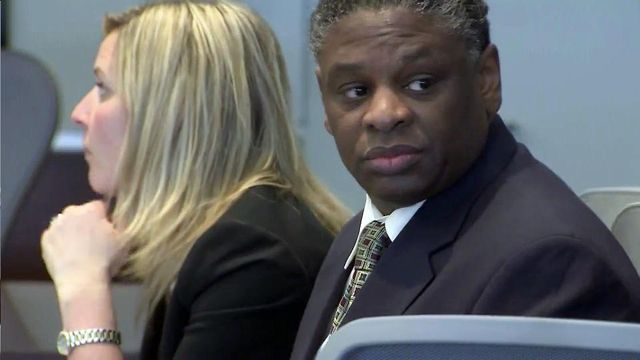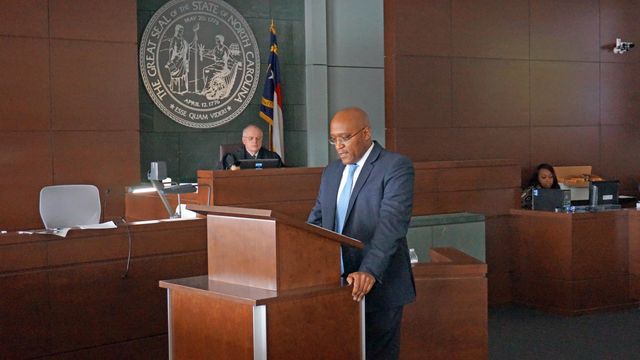Jury to begin deliberations Wednesday in 'sleepwalking' murder trial
The case of Joseph Anthony Mitchell, a man who claims to have been sleepwalking when he killed his son more than four years ago, is now in the hands of a jury after attorneys on Tuesday presented their closing arguments.
Posted — UpdatedMitchell is charged with first-degree murder and two counts of attempted first-degree murder in the Sept. 22, 2010, strangulation death of 4-year-old Blake and attacks on his older children, Alexis, who was 13 at the time, and Devon, who was 10, in their home.
After attacking the children, Mitchell barricaded himself in a home office and stabbed himself three times in the chest and slit his throat, witnesses have said. Durham County deputies had to break through a door to get to him.
Defense attorney Jay Ferguson said Tuesday that the jury should look at the evidence in the case and put aside their anger over the death of Blake. He said Mitchell was unaware of his actions.
“Temper that anger with rationality. Look at the evidence in this case and decide if you are fully satisfied and entirely convinced,” Ferguson said. “Because what we don’t want is another tragedy, and that’s the wrongful conviction of a man who loved his kids more than anything on this earth.”
Ferguson said the state has not proven beyond a reasonable that Mitchell intended to kill his son and harm his older children, and he said there was no motive for Mitchell to harm his family.
“If he intended to kill Devon, why would he leave the room on three different occasions and come back?” Ferguson asked the jury. “If he really intended to, he could have done so. If he intended to kill his whole family, why wouldn’t he start with his wife? What was the plan?”
Durham County District Attorney Roger Echols said that the family’s financial troubles and Mitchell’s “prideful” manner are what led to the murder of his son, saying that Mitchell created a “façade” that kept his wife and family from knowing his true character.
“He couldn’t come through for his family. He used a veil of lies to create, through deceit, the Joseph Mitchell that he wanted to be. The façade to hide the Joseph Mitchell that he was,” Echols said.
Echols finished his closing arguments by asking the jury to provide justice for Blake.
“If this is a community that protects its children, there is only one verdict. If this is a system in which justice matters, there is only one verdict. If you, the jury, want to speak the truth with your verdict, there is only one verdict,” Echols said. “Blake Mitchell had four years, seven months and six days on this earth. The defendant will live with your verdict. Blake doesn’t have that chance.”
Dr. George Corvin, a forensic psychiatrist who testified for the defense, said last week that Mitchell was likely suffering from "non-REM parasomnia," a sleep disorder where he could perform random acts unconsciously and could become violent if triggered by a loud noise.
Mitchell testified that he was in financial distress, having been unemployed for two years and trying to secretly rescue his home from foreclosure, and had gotten little sleep in the weeks leading up to Blake's death.
Corvin said stress and a lack of sleep likely led to the parasomnia, and he said Mitchell was incapable of exercising any criminal intent in carrying out the attacks.
Nancy Laney, a psychologist at Central Regional Hospital in Butner who interviewed Mitchell four times over the past year, disputed that claim on Monday, saying she found no evidence that Mitchell suffered from any mental condition that would have left him unconscious at the time of the attacks. She argued that he consciously planned and carried out the crime.
Ferguson on Tuesday repeatedly questioned why Laney didn't reference parts of Mitchell's records in writing her report, suggesting that she had "confirmation bias" and was cherry-picking details to support her conclusions.
"My job is not to determine the facts," Laney said. "I don't even know if I have all of the facts. I try and give facts that are related to what I need to answer."
If convicted, Mitchell could spend the rest of his life in prison without the possibility of parole.
• Credits
Copyright 2024 by Capitol Broadcasting Company. All rights reserved. This material may not be published, broadcast, rewritten or redistributed.






